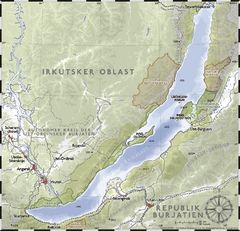Lake Baikal
| Lake Baikal | |
|---|---|
 |
|
 |
|
| Location | Siberia, Russia |
| Coordinates | 53°30′N 108°0′E / 53.500°N 108.000°ECoordinates: 53°30′N 108°0′E / 53.500°N 108.000°E |
| Lake type | Continental rift lake |
| Primary inflows | Selenge, Barguzin, Upper Angara |
| Primary outflows | Angara |
| Catchment area | 560,000 km2 (216,000 sq mi) |
| Basin countries | Russia and Mongolia |
| Max. length | 636 km (395 mi) |
| Max. width | 79 km (49 mi) |
| Surface area | 31,722 km2 (12,248 sq mi) |
| Average depth | 744.4 m (2,442 ft) |
| Max. depth | 1,642 m (5,387 ft) |
| Water volume | 23,615.39 km3 (5,670 cu mi) |
| Residence time | 330 years |
| Shore length1 | 2,100 km (1,300 mi) |
| Surface elevation | 455.5 m (1,494 ft) |
| Frozen | January–May |
| Islands | 27 (Olkhon) |
| Settlements | Irkutsk |
| Type | Natural |
| Criteria | vii, viii, ix, x |
| Designated | 1996 (22nd session) |
| Reference no. | 754 |
| State Party | Russia |
| Region | Asia |
| 1 Shore length is not a well-defined measure. | |
Lake Baikal (Russian: о́зеро Байка́л, tr. Ozero Baykal; IPA: [ˈozʲɪrə bɐjˈkɑl]; Buryat: Байгал нуур, Mongolian: Байгал нуур, Baygal nuur, etymologically meaning, in Mongolian, "the Nature Lake") is a rift lake in Russia, located in southern Siberia, between Irkutsk Oblast to the northwest and the Buryat Republic to the southeast.
Lake Baikal is the largest freshwater lake by volume in the world, containing roughly 20% of the world's unfrozen surface fresh water. With 23,615.39 km3 (5,670 cu mi) of fresh water, it contains more water than the North American Great Lakes combined. With a maximum depth of 1,642 m (5,387 ft), Baikal is the world's deepest lake. It is considered among the world's clearest lakes and is considered the world's oldest lake — at 25 million years. It is the seventh-largest lake in the world by surface area.
Like Lake Tanganyika, Lake Baikal was formed as an ancient rift valley, having the typical long crescent shape with a surface area of 31,722 km2 (12,248 sq mi). Baikal is home to thousands of species of plants and animals, many of which exist nowhere else in the world. The lake was declared a UNESCO World Heritage Site in 1996. It is also home to Buryat tribes who reside on the eastern side of Lake Baikal, rearing goats, camels, cattle, and sheep, where the mean temperature varies from a winter minimum of −19 °C (−2 °F) to a summer maximum of 14 °C (57 °F).
...
Wikipedia
